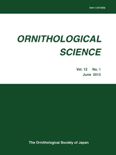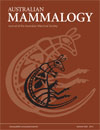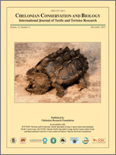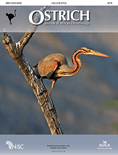
PRIMATES
metrics 2024
Unveiling the mysteries of primate behavior and biology.
Introduction
PRIMATES is a distinguished academic journal dedicated to advancing the field of primatology, published by SPRINGER JAPAN KK. Since its inception in 1957, the journal has served as a vital platform for researchers, professionals, and students passionate about the study of primates, their behavior, biology, and conservation. With a robust publication history extending to 2024 and a current ranking in the Q2 category of Animal Science and Zoology according to Scopus, PRIMATES promotes high-quality research that enhances our understanding of these remarkable species. The journal does not offer open access, ensuring that each article is meticulously curated for its discerning audience, who seek to stay informed of the latest findings and methodologies in primate research. The journal is based in Japan and continues to play an important role in the global scientific community, providing significant contributions to both the academic literature and conservation efforts surrounding primate species.
Metrics 2024
 0.45
0.45 1.30
1.30 1.60
1.60 61
61Metrics History
Rank 2024
Scopus
IF (Web Of Science)
JCI (Web Of Science)
Quartile History
Similar Journals

JOURNAL OF ETHOLOGY
Unraveling the Mysteries of Animal DynamicsJournal of Ethology, published by Springer Japan KK, is a prominent academic journal that focuses on the study of animal behavior and ecology. With an ISSN of 0289-0771 and an E-ISSN of 1439-5444, this journal serves as a critical platform for researchers, professionals, and students interested in the intricate dynamics of animal behavior and its ecological implications. The journal is recognized for its contributions to the fields of Animal Science and Zoology, and Ecology, Evolution, Behavior and Systematics, achieving a respectable Q3 quartile ranking in both categories as of 2023. Although it is not an open access journal, it offers extensive research articles and reviews, bridging theoretical and practical aspects of ethology. Spanning an extensive publishing history from 1983 to 2024, the Journal of Ethology aims to disseminate high-quality research that enhances our understanding of animal behavior, fostering interdisciplinary connections and advancing knowledge in animal welfare, conservation, and behavioral ecology.

ORNITHOLOGICAL SCIENCE
Unveiling the secrets of avian biology and behavior.ORNITHOLOGICAL SCIENCE, published by the Ornithological Society of Japan in collaboration with the University of Tokyo, stands as a pivotal platform for advancing knowledge in the field of ornithology. With a keen focus on avian biology and conservation, this esteemed journal is dedicated to publishing high-quality research, reviews, and technical notes that explore the intricacies of bird science. Although currently categorized within the Q4 quartile in Animal Science and Zoology, the journal aims to elevate its standings by fostering scholarly communication and impactful scientific discourse. This journal has been consistently publishing since its inception in 2002, with a brief hiatus before resuming its invaluable contributions to the scientific community in 2009. Despite the absence of specific open access options, the journal remains a crucial resource for researchers, professionals, and students seeking to expand their understanding of avian ecology and behavior. Through its comprehensive scope, ORNITHOLOGICAL SCIENCE reflects the increasing importance of ornithological studies in addressing global biodiversity issues and conservation challenges.

AUSTRALIAN MAMMALOGY
Championing Insights into Australia’s Diverse Mammal SpeciesAustralian Mammalogy, published by CSIRO PUBLISHING, is a pivotal journal in the fields of Animal Science and Zoology as well as Ecology, Evolution, Behavior and Systematics. With its ISSN 0310-0049 and E-ISSN 1836-7402, this esteemed journal has been instrumental in disseminating critical research findings since 2000, and continues to evolve up to 2024. Ranked in the Q2 quartile of both its categories for 2023, it showcases a diverse array of studies that contribute to understanding Australia’s unique mammalian fauna and its ecological dynamics. Researchers, professionals, and students will find valuable insights in its peer-reviewed articles, which are essential for advancing knowledge in these essential scientific disciplines. Located in Australia at UNIPARK, Locked Bag 10, Clayton, VIC, this journal remains committed to fostering scholarly communication within the global scientific community.

BIOLOGICAL JOURNAL OF THE LINNEAN SOCIETY
Advancing knowledge in ecology and evolution.BIOLOGICAL JOURNAL OF THE LINNEAN SOCIETY is a prestigious, peer-reviewed journal published by Oxford University Press that serves as a leading platform for original research in the fields of ecology, evolution, behavior, and systematics. With its ISSN of 0024-4066 and E-ISSN 1095-8312, this journal has maintained an impressive Q1 ranking in the latest Scopus statistics, which firmly positions it among the top tier of journals in its category (ranked #197 out of 721). Established in 1969, it covers a broad range of topics crucial for understanding biodiversity and the evolutionary processes shaping it, with its coverage extended until 2024. Though it does not operate under an open-access model, it ensures wide visibility and dissemination of impactful research findings. The journal is key for researchers, professionals, and students dedicated to advancing knowledge in biological sciences, fostering interdisciplinary collaboration, and addressing pressing ecological challenges.

Neotropical Biology and Conservation
Exploring the Rich Tapestry of Neotropical LifeNeotropical Biology and Conservation, published by Pensoft Publishers, serves as a pivotal platform for researchers and professionals dedicated to the understanding and preservation of biodiversity in the Neotropical region. This Open Access journal, operational since 2006 and based in Brazil, invites contributions that delve into the complexities of ecology, evolution, and conservation strategies pertinent to the diverse ecosystems of South and Central America. With a commendable 2023 impact factor reflected in its Q3 rankings across multiple categories including Animal Science, Ecology, and Plant Science, it stands as a valuable resource for academics seeking to publish innovative findings and foster dialogue in these critical areas of study. The journal's commitment to open access ensures that knowledge is readily available to anyone interested in advancing the field of neotropical biology and conservation. Join the global conversation and contribute to the vital work of preserving our planet’s rich biological heritage through rigorous research published in this esteemed journal.

CHELONIAN CONSERVATION AND BIOLOGY
Uniting experts to tackle the challenges of chelonian biology.Chelonian Conservation and Biology is a distinguished academic journal dedicated to advancing the field of chelonian research, encompassing conservation, ecology, and biology of turtles and tortoises. Published by Allen Press Inc in the United States, this journal is well-regarded within the realm of Animal Science and Zoology, as well as Ecology, Evolution, Behavior and Systematics, holding a commendable Q3 ranking in both categories for 2023. With an ISSN of 1071-8443 and an E-ISSN of 1943-3956, the journal features a diverse range of articles aimed at professionals, researchers, and students, fostering an understanding of the critical challenges facing chelonians worldwide. Although not an open-access publication, Chelonian Conservation and Biology provides high-quality content, including original research, reviews, and case studies, encouraging engagement and collaboration among experts. With coverage extending from 2006 to 2024, the journal serves as a vital platform for disseminating knowledge and promoting conservation efforts essential to the survival of these remarkable species.

ACTA OECOLOGICA-INTERNATIONAL JOURNAL OF ECOLOGY
Exploring the Frontiers of Ecological KnowledgeACTA OECOLOGICA-INTERNATIONAL JOURNAL OF ECOLOGY, published by Elsevier, stands as a prominent platform for disseminating innovative research in the diverse field of ecology. Operating since 1983 and continuing to make significant contributions into 2024, this journal features critical studies that advance our understanding of ecological systems, behaviors, and conservation efforts. With an impressive Q2 ranking in both the ecology and nature conservation categories, it exemplifies high-quality scholarship, reflected in its Scopus rankings—#74 in Environmental Science and #254 in Agricultural and Biological Sciences. Researchers, professionals, and students in the field are invited to explore the latest findings and methodologies that address pivotal ecological issues. As a journal committed to fostering academic collaboration, ACTA OECOLOGICA is essential for anyone dedicated to enhancing their comprehension of ecological dynamics and advancing sustainability practices globally.

SPIXIANA
Connecting Research and Conservation in ZoologySPIXIANA is a distinguished journal dedicated to the fields of animal science and zoology, published by VERLAG DR FRIEDRICH PFEIL in Germany. With the ISSN 0341-8391, it has been contributing to the scientific community since its inception, with volumes converging from 2008 to 2024. Although currently listed in the Q4 quartile of the 2023 category rankings for Animal Science and Zoology, it provides a vital platform for researchers and professionals to disseminate significant findings in the field. Despite being unindexed in open access, SPIXIANA ensures that vital research reaches its audience, enhancing academic discourse and furthering our understanding of zoological sciences. Its commitment to sharing rigorous scientific research make it an important resource for anyone passionate about animal biology and conservation.

OSTRICH
Unveiling Insights in Avian Behavior and SystematicsOSTRICH, a distinguished journal published by Taylor & Francis Ltd, serves as a pivotal platform for disseminating research in the fields of ecology, evolution, behavior, and systematics. With an ISSN of 0030-6525 and an E-ISSN of 1727-947X, this journal has been contributing vital insights to the scientific community since its inception in 1930. Maintained in the UK, OSTRICH holds a respectable Q3 category ranking in the 2023 Ecology, Evolution, Behavior, and Systematics quartiles and ranks 408th out of 721 within its scientific domain according to Scopus, showcasing a competitive position within the 43rd percentile. OSTRICH is committed to publishing high-quality research that informs conservation efforts and biodiversity studies, making it an essential resource for researchers, professionals, and students interested in avian biology and related ecological fields. While not currently an open-access journal, OSTRICH offers varied access options through institutions and libraries, further widening its reach and impact within the scientific community. We invite academics and practitioners to explore its valuable articles that drive forward innovations in avian research.

Journal of Fish and Wildlife Management
Advancing conservation through innovative research.The Journal of Fish and Wildlife Management, published by the U.S. Fish & Wildlife Service, serves as a vital resource for scholars, researchers, and professionals in the fields of Animal Science, Ecology, and Conservation Biology. With its ISSN 1944-687X, this esteemed journal has been disseminating critical research findings since 2010, contributing significantly to the understanding of fish and wildlife conservation practices and their ecological impacts. Despite its Q3 category rankings in various disciplines as of 2023, it provides a platform for innovative research that influences policy and management strategies for biodiversity conservation. The journal, although not open access, remains committed to advancing the scientific discourse surrounding wildlife management with articles that emphasize practical conservation efforts and ecological sustainability. Readers can expect a diverse range of articles that promote best practices in the management and conservation of fish and wildlife resources, furthering our collective mission of preserving ecological health and biodiversity for future generations.